Unit 2 What time do you go to school? Section B (2a-2c) 课件 (共34张PPT)
文档属性
| 名称 | Unit 2 What time do you go to school? Section B (2a-2c) 课件 (共34张PPT) |
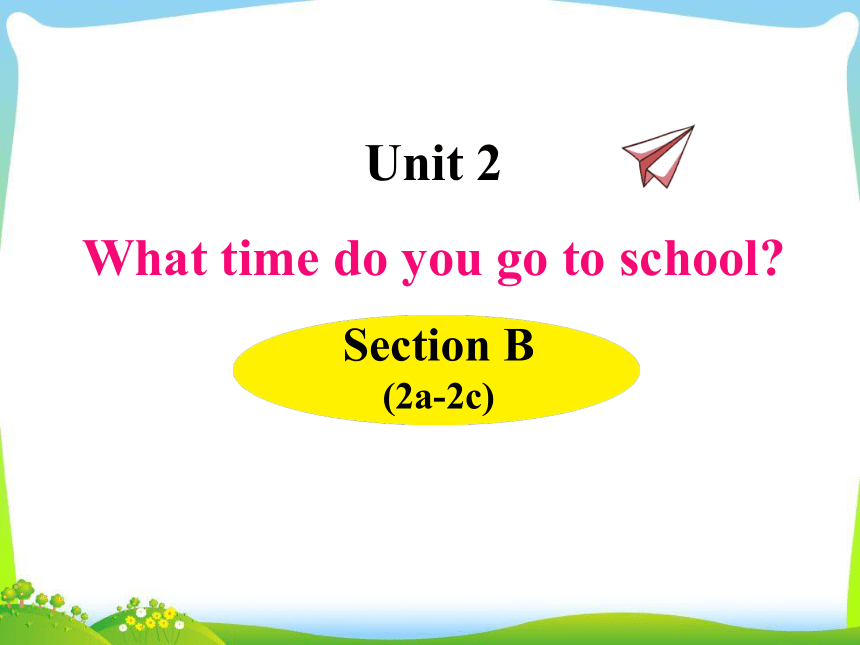
|
|
| 格式 | pptx | ||
| 文件大小 | 2.3MB | ||
| 资源类型 | 教案 | ||
| 版本资源 | 人教新目标(Go for it)版 | ||
| 科目 | 英语 | ||
| 更新时间 | 2023-02-04 00:00:00 | ||
图片预览

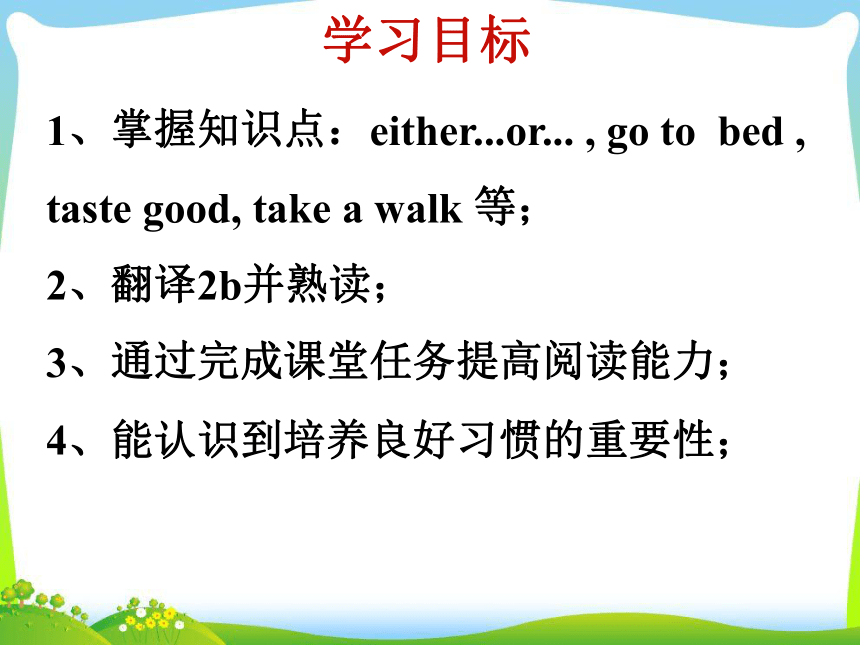

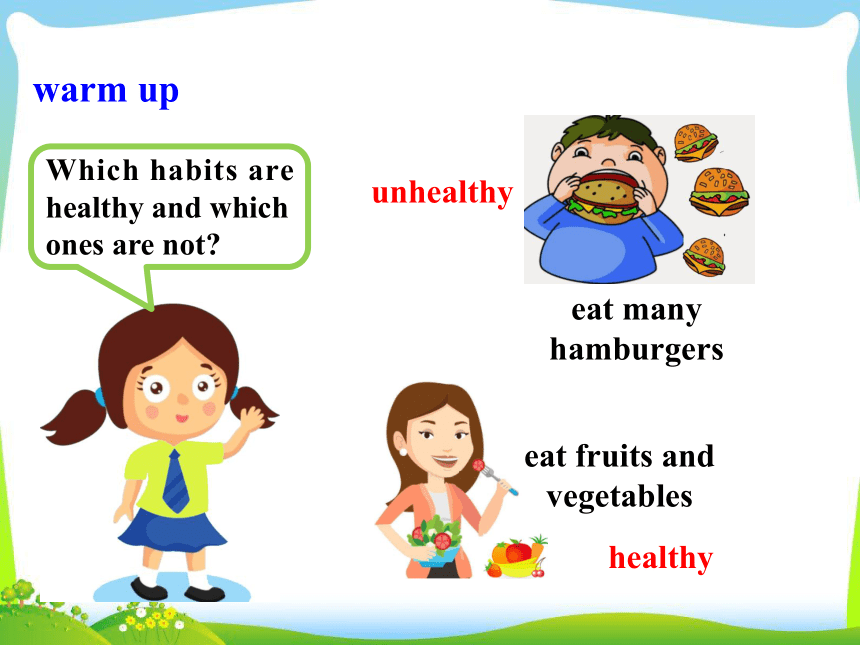

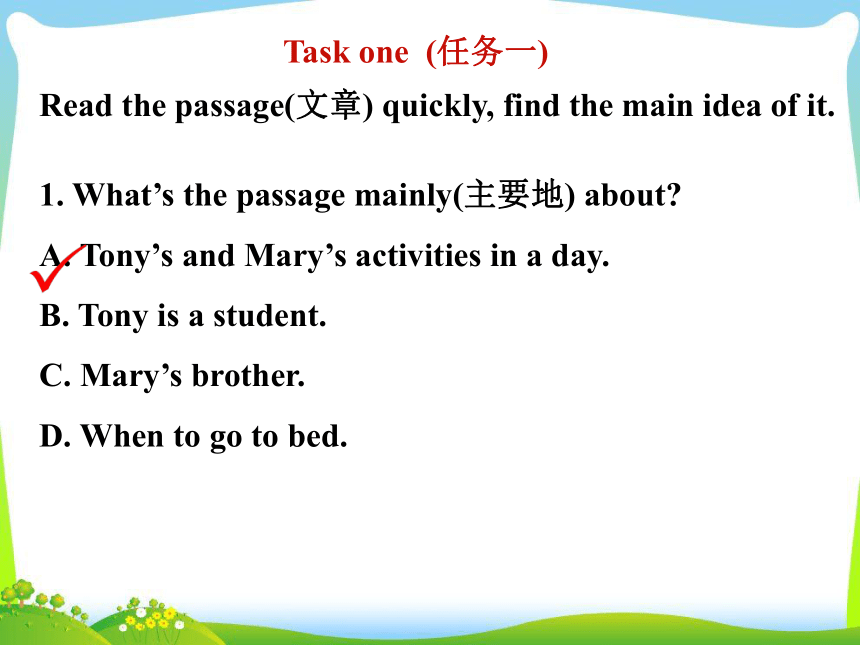
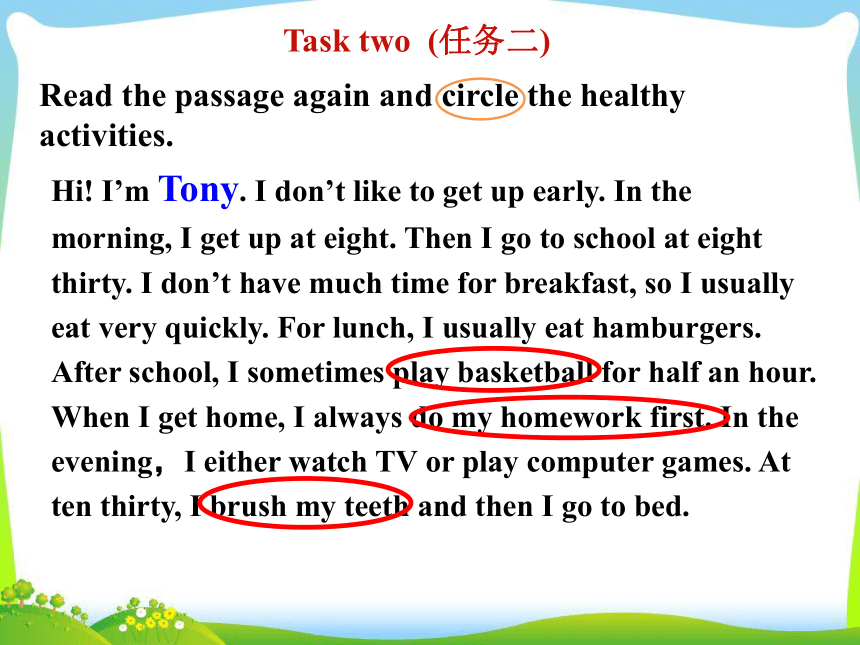
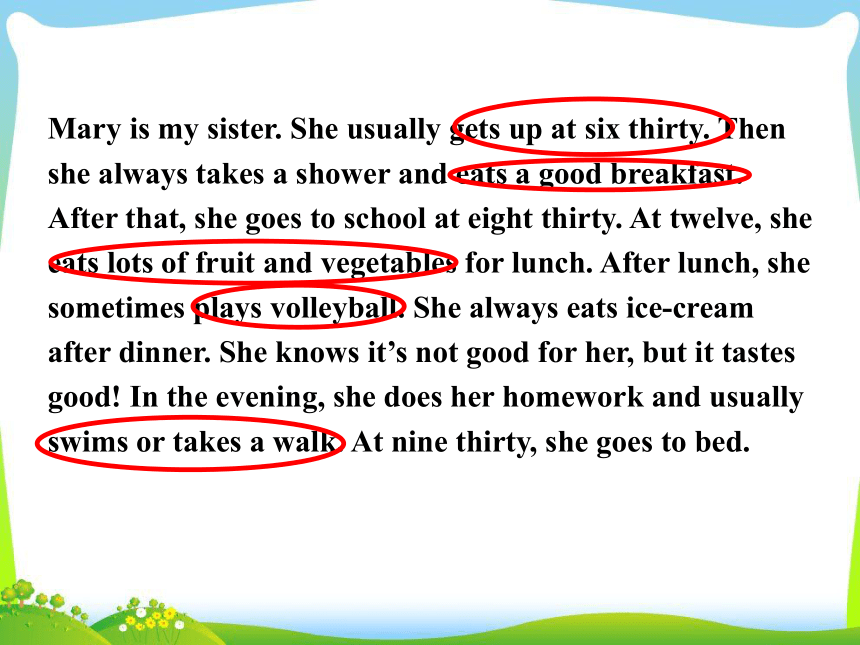
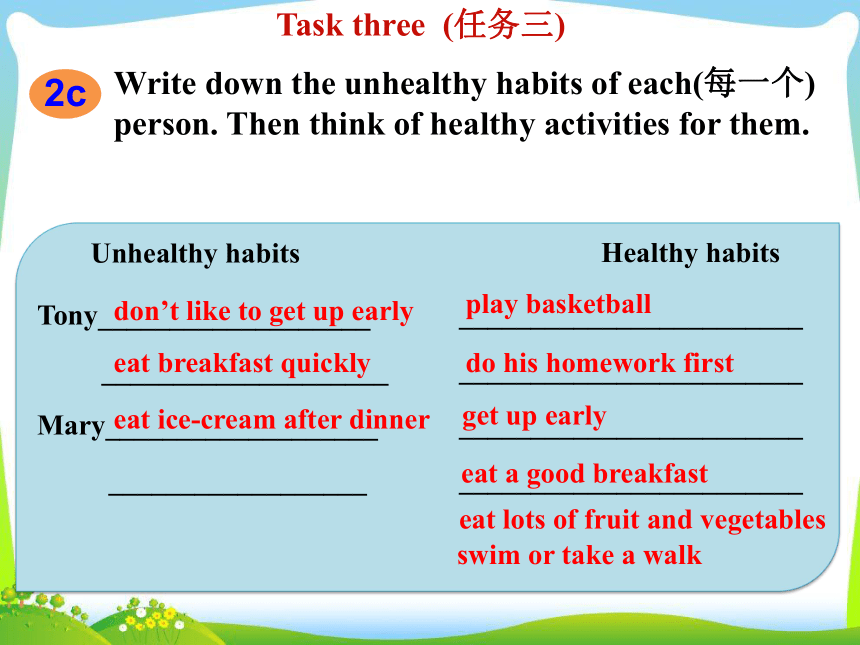
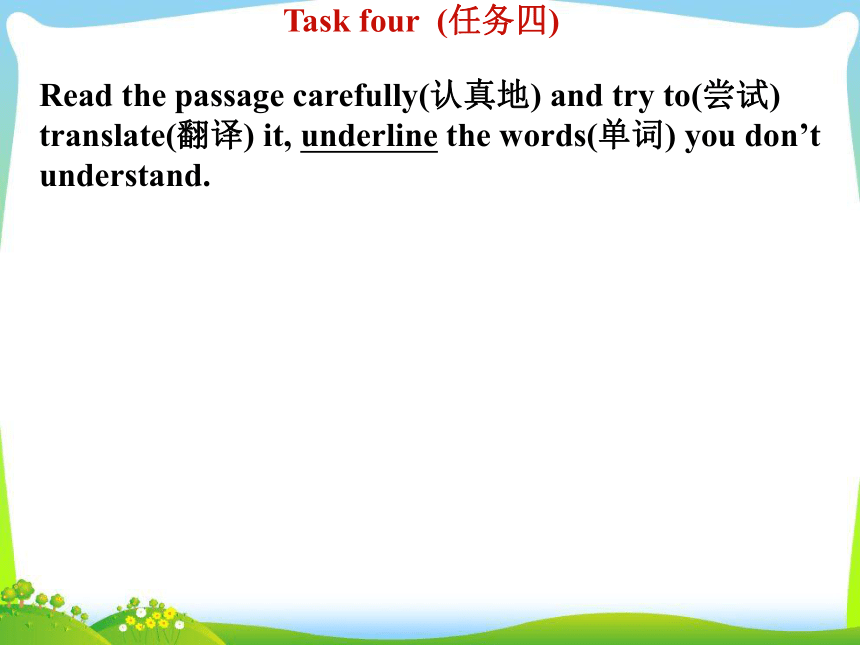
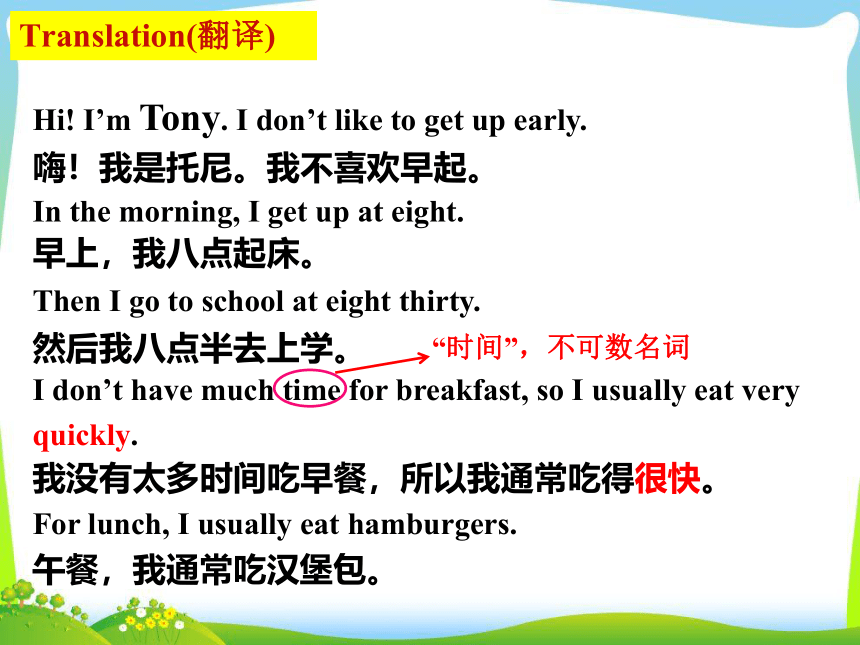
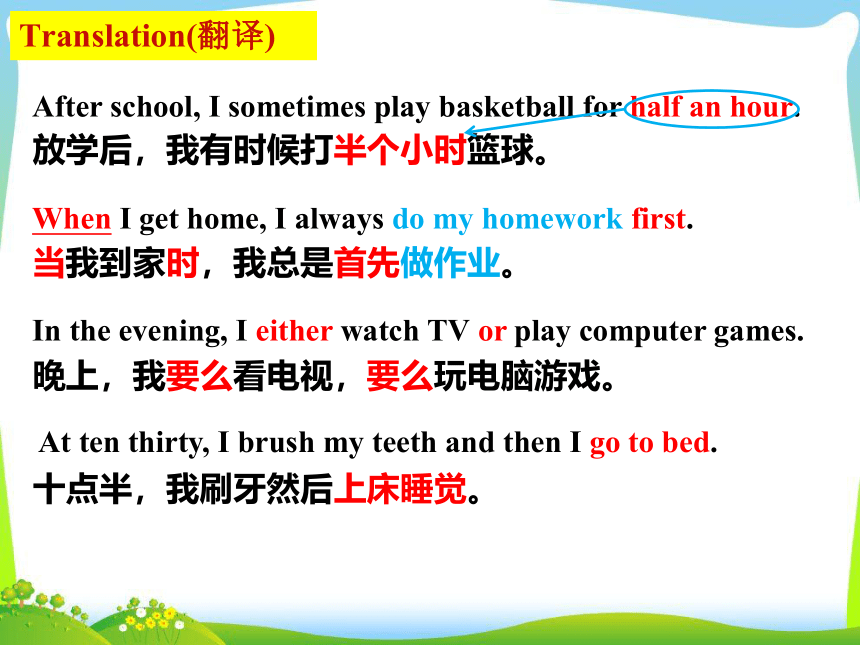
文档简介
(共34张PPT)
Section B
(2a-2c)
Unit 2
What time do you go to school
学习目标
1、掌握知识点:either...or... , go to bed , taste good, take a walk 等;
2、翻译2b并熟读;
3、通过完成课堂任务提高阅读能力;
4、能认识到培养良好习惯的重要性;
学习目标
warm up
Which habits(习惯) are healthy and which ones are not
eat quickly(快速地)
do exercise
unhealthy
healthy
warm up
Which habits are healthy and which ones are not
eat many hamburgers
eat fruits and vegetables
unhealthy
healthy
Check(√) the activities(活动) you think are healthy.
2a
____ go to bed early ____ eat ice-cream
____ eat quickly ____ eat vegetables
____ play sports ____ take a walk
√
√
√
√
pre-reading(读前)
早早上床睡觉
快速地吃
做体育运动
吃冰激凌
吃蔬菜
散步
Task one (任务一)
Read the passage(文章) quickly, find the main idea of it.
1. What’s the passage mainly(主要地) about
A. Tony’s and Mary’s activities in a day.
B. Tony is a student.
C. Mary’s brother.
D. When to go to bed.
Hi! I’m Tony. I don’t like to get up early. In the morning, I get up at eight. Then I go to school at eight thirty. I don’t have much time for breakfast, so I usually eat very quickly. For lunch, I usually eat hamburgers. After school, I sometimes play basketball for half an hour. When I get home, I always do my homework first. In the evening,I either watch TV or play computer games. At ten thirty, I brush my teeth and then I go to bed.
Read the passage again and circle the healthy activities.
Task two (任务二)
Mary is my sister. She usually gets up at six thirty. Then she always takes a shower and eats a good breakfast.
After that, she goes to school at eight thirty. At twelve, she eats lots of fruit and vegetables for lunch. After lunch, she sometimes plays volleyball. She always eats ice-cream after dinner. She knows it’s not good for her, but it tastes good! In the evening, she does her homework and usually swims or takes a walk. At nine thirty, she goes to bed.
Write down the unhealthy habits of each(每一个) person. Then think of healthy activities for them.
2c
Tony___________________
____________________
Mary___________________
__________________
Unhealthy habits
don’t like to get up early
eat breakfast quickly
eat ice-cream after dinner
Healthy habits
________________________
________________________
________________________
________________________
play basketball
do his homework first
get up early
eat a good breakfast
eat lots of fruit and vegetables
swim or take a walk
Task three (任务三)
Read the passage carefully(认真地) and try to(尝试) translate(翻译) it, underline the words(单词) you don’t understand.
Task four (任务四)
Hi! I’m Tony. I don’t like to get up early.
In the morning, I get up at eight.
Then I go to school at eight thirty.
I don’t have much time for breakfast, so I usually eat very quickly.
For lunch, I usually eat hamburgers.
嗨!我是托尼。我不喜欢早起。
早上,我八点起床。
然后我八点半去上学。
我没有太多时间吃早餐,所以我通常吃得很快。
午餐,我通常吃汉堡包。
Translation(翻译)
“时间”,不可数名词
After school, I sometimes play basketball for half an hour.
When I get home, I always do my homework first.
In the evening, I either watch TV or play computer games.
At ten thirty, I brush my teeth and then I go to bed.
放学后,我有时候打半个小时篮球。
当我到家时,我总是首先做作业。
晚上,我要么看电视,要么玩电脑游戏。
十点半,我刷牙然后上床睡觉。
Translation(翻译)
1. I don’t have much time for breakfast, so I usually eat very quickly.
(1) much 在此处意为“很多”,后接不可数名词。常与 so, too 等词连用。
知识点
① Don’t eat too much junk food.
别吃太多垃圾食品。
② I have so much homework every day.
我每天有好多家庭作业。
不可数名词
(2) time 意为“时间”,不可数名词。
1. I don’t have much time for breakfast, so I usually eat very quickly.
(1) eat quickly 意为“吃得快”
知识点
quickly 副词,意为“很快地”,一般强调动作或思维快且用时少。其形容词为quick, 意为“快的”;
① He eats lunch quickly. 他快速地吃午餐。
② He eats a quick lunch. 他午餐吃得快。
③ He gets dressed quickly. 她很快地穿上衣服。
2. After school, I sometimes play basketball for half an hour.
(1)half an hour 半个小时
知识点
half 一半,半数
① Half of the books are about music.
一半的书是关于音乐的。
② Half of the students can speak English well.
一半的学生能说好英语。
2. After school, I sometimes play basketball for half an hour.
知识点
(2) for 后面跟时间时,表示某件事情持续的时间。
① I usually read books for an hour after dinner.
我通常在晚餐后读半个小时的书。
② I like to exercise for half an hour every day.
我喜欢每天锻炼半个小时。
3. I either watch TV or play computer games.
我要么看电视,要么玩电脑游戏。
either ... or ... 意为“要么...... 要么......, 或者...... 或者......”,表示选择,用来连接并列的成分。
知识点
① You can play the piano. 你可以弹钢琴。
You can play the violin. 你可以拉小提琴。
重点
You can either play the piano or play the violin.
You can play either the piano or the violin.
你可以弹钢琴或拉小提琴。
3. I either watch TV or play computer games.
我要么看电视,要么玩电脑游戏。
either ... or ... 意为“要么...... 要么......, 或者...... 或者......”,表示选择,用来连接并列的成分。
知识点
② You can eat either apples or oranges.
你可以吃苹果或橙子。
③ He either plays basketball or does his homework after school.
放学后,他要么打篮球,要么做家庭作业。
重点
3. I either watch TV or play computer games.
我要么看电视,要么玩电脑游戏。
【注意】either ... or ... 连接两个并列主语时,谓语动词的形式由离它最近的主语决定。即遵循“就近原则”。
知识点
① Either you or I am right. 你或者我是对的。
② Either I or you are right. 我或者你是对的。
重点
③ Either Lily or they like music.
莉莉或她们喜欢音乐。
④ Either they or Lily likes music.
他们或莉莉喜欢音乐。
针对训练
1. Either the teacher or the students _____ him very well.
A. know B. knows C. to know
2. Either the students or the teacher _____ him very well.
A. know B. knows C. to know
3. I either watch TV or play computer games.
我要么看电视,要么玩电脑游戏。
知识点
【拓展】either 还可以用作副词,意为“也”,常用于否定句句末。
① Lily doesn’t like math. I don’t like it, either.
莉莉不喜欢数学。我也不喜欢它。
② My brother can’t play the piano, I can’t play it, either.
我兄弟不会弹钢琴,我也不会。
3. I either watch TV or play computer games.
我要么看电视,要么玩电脑游戏。
知识点
【辨析】too, also, either的区别
either 用于否定句句末
too 用于肯定句句末
also 用于肯定句句中
① Lily doesn’t like math. I don’t like it, either.
② Lily likes math. I like it, too.
③ I like math. I also like English.
针对训练
1. Joe can’t speak Chinese. John can’t speak it, _______.
A. too B. also C. either
2. I have a basketball. Scott has one, _______.
A. too B. also C. either
Mary is my sister.
She usually gets up at six thirty.
Then she always takes a shower and eats a good breakfast. After that, she goes to school at eight thirty.
At twelve, she eats lots of fruit and vegetables for lunch. After lunch, she sometimes plays volleyball.
玛丽是我的妹妹。
她通常六点半起床。
然后她总是洗个澡,吃一顿好的早餐。
之后,她八点半去上学。
12点时,她午餐吃很多水果和蔬菜。
午餐后,她有时打排球。
Translation(翻译)
“很多”,= a lot of
and 连接的两个单词或短语时态需保持一致
She always eats ice-cream after dinner.
She knows it’s not good for her, but it tastes good!
In the evening, she does her homework and usually swims or takes a walk.
At nine thirty, she goes to bed.
她总是晚饭后吃冰激凌。
她知道这对她不好,但它尝起来真不错!
晚上,她做作业,通常游泳或散步。
九点半,她上床睡觉。
Translation(翻译)
1. Then she always takes a shower and eats a good breakfast.
知识点
eat/have a good breakfast 吃一顿好的早餐
当某一顿饭前面有形容词时,需要用不定冠词a/an。
① When my father gets home, I can always have/eat a big dinner.
当我父亲回到家时,我总是能吃一顿大餐。
2. At twelve, she eats lots of fruit and vegetables for lunch.
知识点
lots of 意为 “很多,大量”,等同于“a lot of ” , 后可接可数名词复数或不可数名词。
lots of / a lot of 修饰可数名词复数或不可数名词
many 修饰可数名词复数
much 修饰不可数名词
① I have lots of homework every day.
我每天有很多作业。
② There are a lot of books in the classroom.
教室里有很多书。
可用“much”替换
可用“many”替换
不可数名词
可数名词
针对训练
1. Bob eats _________ healthy food every day.
A. lot of B. a lots of C. a lot of D. many
3. She knows it’s not good for her, but it tastes good!
be good for 意为 “对......有益”,反义词为 be bad for, 意为 “对......有害”。
① Nancy, carrots are good for your eyes(眼睛). Eat some, please.
② Watching TV too much is bad for your eyes.
南希,胡萝卜对你的眼睛有好处。请吃一些。
看太多电视对眼睛不好。
Miss White is good at writing stories. She is good to people, and she is good with children, too. She often says to us, ‘Reading books is good for you.’
be good at 擅长......
be good to 对......好(态度友善)
be good with 善于......打交道
be good for 对......有益
怀特老师擅长写故事。她对人友善,应付孩子也有一套。 她经常对我们说:“多读书对你们有好处。”
针对训练
1. Doing eye exercises is good _____ our eyes.
A. at B. to C. for D. with
3. She knows it’s not good for her, but it tastes good!
taste 意为 “尝起来”,后接形容词。
① The chicken tastes really good.
鸡肉尝起来很不错。
【拓展】感官动词的用法:
眼: 看起来 look
耳: 听起来 sound
口: 尝起来 taste
鼻: 闻起来 smell
皮肤: 摸起来 feel
taste还有“品尝”的意思;
如: The chicken is very nice, you can taste it.
鸡肉很不错,你可以尝尝。
针对训练
1. — Joe, don’t eat too much ice-cream.
— OK, mom. But it ______ really good.
A. looks B. sounds C. tastes D. feels
Thank you
See you !
Section B
(2a-2c)
Unit 2
What time do you go to school
学习目标
1、掌握知识点:either...or... , go to bed , taste good, take a walk 等;
2、翻译2b并熟读;
3、通过完成课堂任务提高阅读能力;
4、能认识到培养良好习惯的重要性;
学习目标
warm up
Which habits(习惯) are healthy and which ones are not
eat quickly(快速地)
do exercise
unhealthy
healthy
warm up
Which habits are healthy and which ones are not
eat many hamburgers
eat fruits and vegetables
unhealthy
healthy
Check(√) the activities(活动) you think are healthy.
2a
____ go to bed early ____ eat ice-cream
____ eat quickly ____ eat vegetables
____ play sports ____ take a walk
√
√
√
√
pre-reading(读前)
早早上床睡觉
快速地吃
做体育运动
吃冰激凌
吃蔬菜
散步
Task one (任务一)
Read the passage(文章) quickly, find the main idea of it.
1. What’s the passage mainly(主要地) about
A. Tony’s and Mary’s activities in a day.
B. Tony is a student.
C. Mary’s brother.
D. When to go to bed.
Hi! I’m Tony. I don’t like to get up early. In the morning, I get up at eight. Then I go to school at eight thirty. I don’t have much time for breakfast, so I usually eat very quickly. For lunch, I usually eat hamburgers. After school, I sometimes play basketball for half an hour. When I get home, I always do my homework first. In the evening,I either watch TV or play computer games. At ten thirty, I brush my teeth and then I go to bed.
Read the passage again and circle the healthy activities.
Task two (任务二)
Mary is my sister. She usually gets up at six thirty. Then she always takes a shower and eats a good breakfast.
After that, she goes to school at eight thirty. At twelve, she eats lots of fruit and vegetables for lunch. After lunch, she sometimes plays volleyball. She always eats ice-cream after dinner. She knows it’s not good for her, but it tastes good! In the evening, she does her homework and usually swims or takes a walk. At nine thirty, she goes to bed.
Write down the unhealthy habits of each(每一个) person. Then think of healthy activities for them.
2c
Tony___________________
____________________
Mary___________________
__________________
Unhealthy habits
don’t like to get up early
eat breakfast quickly
eat ice-cream after dinner
Healthy habits
________________________
________________________
________________________
________________________
play basketball
do his homework first
get up early
eat a good breakfast
eat lots of fruit and vegetables
swim or take a walk
Task three (任务三)
Read the passage carefully(认真地) and try to(尝试) translate(翻译) it, underline the words(单词) you don’t understand.
Task four (任务四)
Hi! I’m Tony. I don’t like to get up early.
In the morning, I get up at eight.
Then I go to school at eight thirty.
I don’t have much time for breakfast, so I usually eat very quickly.
For lunch, I usually eat hamburgers.
嗨!我是托尼。我不喜欢早起。
早上,我八点起床。
然后我八点半去上学。
我没有太多时间吃早餐,所以我通常吃得很快。
午餐,我通常吃汉堡包。
Translation(翻译)
“时间”,不可数名词
After school, I sometimes play basketball for half an hour.
When I get home, I always do my homework first.
In the evening, I either watch TV or play computer games.
At ten thirty, I brush my teeth and then I go to bed.
放学后,我有时候打半个小时篮球。
当我到家时,我总是首先做作业。
晚上,我要么看电视,要么玩电脑游戏。
十点半,我刷牙然后上床睡觉。
Translation(翻译)
1. I don’t have much time for breakfast, so I usually eat very quickly.
(1) much 在此处意为“很多”,后接不可数名词。常与 so, too 等词连用。
知识点
① Don’t eat too much junk food.
别吃太多垃圾食品。
② I have so much homework every day.
我每天有好多家庭作业。
不可数名词
(2) time 意为“时间”,不可数名词。
1. I don’t have much time for breakfast, so I usually eat very quickly.
(1) eat quickly 意为“吃得快”
知识点
quickly 副词,意为“很快地”,一般强调动作或思维快且用时少。其形容词为quick, 意为“快的”;
① He eats lunch quickly. 他快速地吃午餐。
② He eats a quick lunch. 他午餐吃得快。
③ He gets dressed quickly. 她很快地穿上衣服。
2. After school, I sometimes play basketball for half an hour.
(1)half an hour 半个小时
知识点
half 一半,半数
① Half of the books are about music.
一半的书是关于音乐的。
② Half of the students can speak English well.
一半的学生能说好英语。
2. After school, I sometimes play basketball for half an hour.
知识点
(2) for 后面跟时间时,表示某件事情持续的时间。
① I usually read books for an hour after dinner.
我通常在晚餐后读半个小时的书。
② I like to exercise for half an hour every day.
我喜欢每天锻炼半个小时。
3. I either watch TV or play computer games.
我要么看电视,要么玩电脑游戏。
either ... or ... 意为“要么...... 要么......, 或者...... 或者......”,表示选择,用来连接并列的成分。
知识点
① You can play the piano. 你可以弹钢琴。
You can play the violin. 你可以拉小提琴。
重点
You can either play the piano or play the violin.
You can play either the piano or the violin.
你可以弹钢琴或拉小提琴。
3. I either watch TV or play computer games.
我要么看电视,要么玩电脑游戏。
either ... or ... 意为“要么...... 要么......, 或者...... 或者......”,表示选择,用来连接并列的成分。
知识点
② You can eat either apples or oranges.
你可以吃苹果或橙子。
③ He either plays basketball or does his homework after school.
放学后,他要么打篮球,要么做家庭作业。
重点
3. I either watch TV or play computer games.
我要么看电视,要么玩电脑游戏。
【注意】either ... or ... 连接两个并列主语时,谓语动词的形式由离它最近的主语决定。即遵循“就近原则”。
知识点
① Either you or I am right. 你或者我是对的。
② Either I or you are right. 我或者你是对的。
重点
③ Either Lily or they like music.
莉莉或她们喜欢音乐。
④ Either they or Lily likes music.
他们或莉莉喜欢音乐。
针对训练
1. Either the teacher or the students _____ him very well.
A. know B. knows C. to know
2. Either the students or the teacher _____ him very well.
A. know B. knows C. to know
3. I either watch TV or play computer games.
我要么看电视,要么玩电脑游戏。
知识点
【拓展】either 还可以用作副词,意为“也”,常用于否定句句末。
① Lily doesn’t like math. I don’t like it, either.
莉莉不喜欢数学。我也不喜欢它。
② My brother can’t play the piano, I can’t play it, either.
我兄弟不会弹钢琴,我也不会。
3. I either watch TV or play computer games.
我要么看电视,要么玩电脑游戏。
知识点
【辨析】too, also, either的区别
either 用于否定句句末
too 用于肯定句句末
also 用于肯定句句中
① Lily doesn’t like math. I don’t like it, either.
② Lily likes math. I like it, too.
③ I like math. I also like English.
针对训练
1. Joe can’t speak Chinese. John can’t speak it, _______.
A. too B. also C. either
2. I have a basketball. Scott has one, _______.
A. too B. also C. either
Mary is my sister.
She usually gets up at six thirty.
Then she always takes a shower and eats a good breakfast. After that, she goes to school at eight thirty.
At twelve, she eats lots of fruit and vegetables for lunch. After lunch, she sometimes plays volleyball.
玛丽是我的妹妹。
她通常六点半起床。
然后她总是洗个澡,吃一顿好的早餐。
之后,她八点半去上学。
12点时,她午餐吃很多水果和蔬菜。
午餐后,她有时打排球。
Translation(翻译)
“很多”,= a lot of
and 连接的两个单词或短语时态需保持一致
She always eats ice-cream after dinner.
She knows it’s not good for her, but it tastes good!
In the evening, she does her homework and usually swims or takes a walk.
At nine thirty, she goes to bed.
她总是晚饭后吃冰激凌。
她知道这对她不好,但它尝起来真不错!
晚上,她做作业,通常游泳或散步。
九点半,她上床睡觉。
Translation(翻译)
1. Then she always takes a shower and eats a good breakfast.
知识点
eat/have a good breakfast 吃一顿好的早餐
当某一顿饭前面有形容词时,需要用不定冠词a/an。
① When my father gets home, I can always have/eat a big dinner.
当我父亲回到家时,我总是能吃一顿大餐。
2. At twelve, she eats lots of fruit and vegetables for lunch.
知识点
lots of 意为 “很多,大量”,等同于“a lot of ” , 后可接可数名词复数或不可数名词。
lots of / a lot of 修饰可数名词复数或不可数名词
many 修饰可数名词复数
much 修饰不可数名词
① I have lots of homework every day.
我每天有很多作业。
② There are a lot of books in the classroom.
教室里有很多书。
可用“much”替换
可用“many”替换
不可数名词
可数名词
针对训练
1. Bob eats _________ healthy food every day.
A. lot of B. a lots of C. a lot of D. many
3. She knows it’s not good for her, but it tastes good!
be good for 意为 “对......有益”,反义词为 be bad for, 意为 “对......有害”。
① Nancy, carrots are good for your eyes(眼睛). Eat some, please.
② Watching TV too much is bad for your eyes.
南希,胡萝卜对你的眼睛有好处。请吃一些。
看太多电视对眼睛不好。
Miss White is good at writing stories. She is good to people, and she is good with children, too. She often says to us, ‘Reading books is good for you.’
be good at 擅长......
be good to 对......好(态度友善)
be good with 善于......打交道
be good for 对......有益
怀特老师擅长写故事。她对人友善,应付孩子也有一套。 她经常对我们说:“多读书对你们有好处。”
针对训练
1. Doing eye exercises is good _____ our eyes.
A. at B. to C. for D. with
3. She knows it’s not good for her, but it tastes good!
taste 意为 “尝起来”,后接形容词。
① The chicken tastes really good.
鸡肉尝起来很不错。
【拓展】感官动词的用法:
眼: 看起来 look
耳: 听起来 sound
口: 尝起来 taste
鼻: 闻起来 smell
皮肤: 摸起来 feel
taste还有“品尝”的意思;
如: The chicken is very nice, you can taste it.
鸡肉很不错,你可以尝尝。
针对训练
1. — Joe, don’t eat too much ice-cream.
— OK, mom. But it ______ really good.
A. looks B. sounds C. tastes D. feels
Thank you
See you !
同课章节目录
- Unit 1 Can you play the guitar?
- Section A
- Section B
- Unit 2 What time do you go to school?
- Section A
- Section B
- Unit 3 How do you get to school?
- Section A
- Section B
- Unit 4 Don't eat in class.
- Section A
- Section B
- Unit 5 Why do you like pandas?
- Section A
- Section B
- Unit 6 I'm watching TV.
- Section A
- Section B
- Review of Units 1-6
- Unit 7 It's raining!
- Section A
- Section B
- Unit 8 Is there a post office near here?
- Section A
- Section B
- Unit 9 What does he look like?
- Section A
- Section B
- Unit 10 I'd like some noodles.
- Section A
- Section B
- Unit 11 How was your school trip?
- Section A
- Section B
- Unit 12 What did you do last weekend?
- Section A
- Section B
